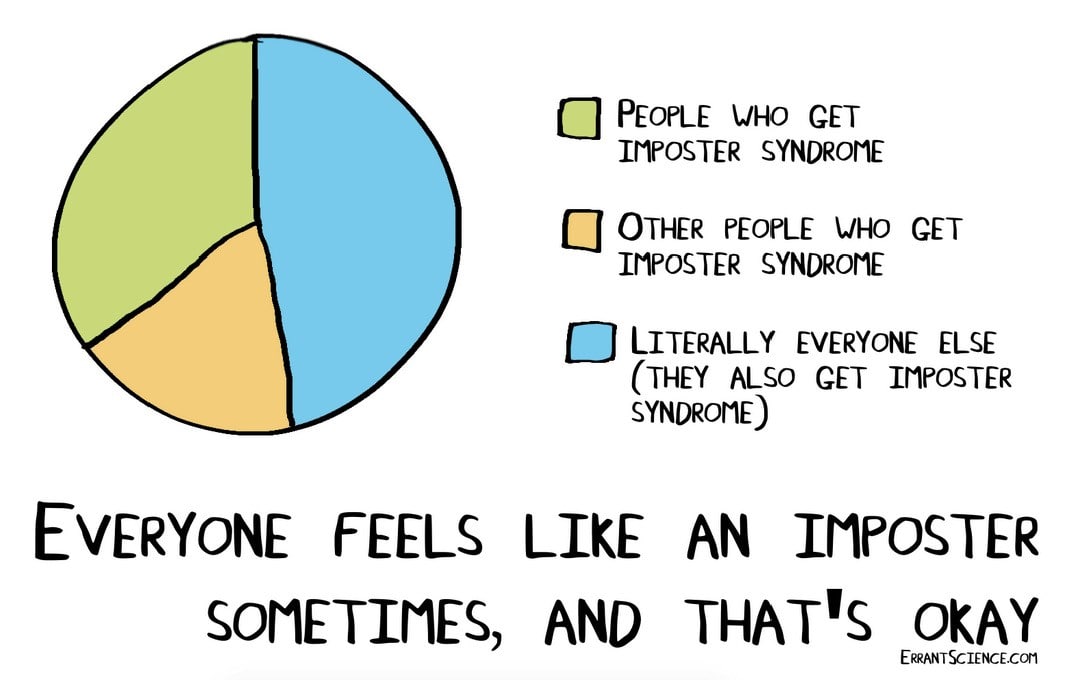Long gone are the days where having a stable job is seen as a sign of success. To be successful today, it seems like you need to have a dream job, a prosperous side hustle, and reach a level of work-life balance that eludes all of us. There’s a huge emphasis on the knowledge and skills you need to get this dream job, to negotiate all the job perks, and then to get promoted.
But what if you can’t figure out what your dream job is?
What if you are trying, following all of the best advice, but still not getting there?
What if you thought you were living your dream job, and then discovered you were massively underpaid?
That’s what happened to me. After getting my PhD, I got an amazing non-academic job that I loved. Over seven years at the organization, I grew my team from 0 to 20 staff. I was managing millions of dollars in contracts every year. I was learning new skills and taking on new challenges. Then one day, almost exactly a year ago, I discovered (by accident) that my colleague with virtually the same job was paid 47% more money than me. I was shocked, disappointed, and angry.
Then I started doing a lot of research (that’s what PhDs do). I ultimately quit my job and started my own consulting company. Since it is pretty unusual in my field for women in their 30s to go out as consultants, many people have approached me about career directions and decisions since I made this major career change. The most common conversations get back to their struggle to figure out what their dream job really is. It’s as if we have a vision that there is a perfect job out there waiting for us, and we just need to find it. But jobs don’t work that way, and if you are envisioning that there is one dream job out there for you, you are not setting yourself up for success.
Instead we need to re-frame the conversation. The goal isn’t to have a dream job, it’s to have a life you love. That includes a job that you love (that pays you appropriately), but it is part of a much bigger picture. So instead of thinking about the characteristics of your dream job, what if you asked yourself what a successful life looks like for you? Then you need to ask yourself whether your fears and insecurities are getting in the way.
Shift your mindset to get the job you want and deserve
What do you really want?
As you search and apply for jobs, it is so easy to go for the position that fits the life we think we should have. We have this idea of what it mean to be a grown-up and be successful. Often these ideas have lingered since we were children. We pick careers because other people (our parents, our teachers, a professor, or a great boss) told us we would be good at something. We get stuck in this pattern of comparing ourselves to others, which leads us to feel bad about ourselves and make unwise decisions. If you pick a career because it’s what you think you should do or other people think you would be good at it, there’s a good chance that a few years in you will realize your job does not bring you happiness or success.
You might even be at that point now – realizing that what you thought you wanted isn’t really making your happy.
Are you struggling to get hired into a position you don’t really want?
It is much harder to get a job, if deep down it doesn’t represent the things that you are truly passionate about.
As I grew my team from 0 to 20 people, I interviewed hundreds of candidates over the years. Most of the positions were for research assistants and research coordinators, people right out of an undergraduate or Master’s program. I interviewed lots and lots of amazing candidates with incredible credentials, who just weren’t that passionate about what we were doing. Often I could tell that they didn’t even see that – they thought they really wanted this job. But really they wanted the idea of the job. They like the prestige of the organization. They liked the opportunities the job would provide. They thought the topic was vaguely interesting.
Over the years, I learned (through trial and error and talking to much more experienced managers) that these are not the people to hire into intellectually challenging positions. Candidates who were really passionate (even if they had less experience) were much more successful and much happier (and easier to manage). The people who were passionate thrived on the challenges. They jumped at the opportunities to take on new projects and new directions. As our team grew and changed, they grew and changed with us.
Think about your own job search – is this truly the kind of position you want? Are you passionate about the topic or the process? It doesn’t need to be the “dream job”, but even a stepping stone in the right direction will get you much more invested in the position.
It’s not just about your dream job, what does your best life look like?
Lots of people really buy into the idea of a dream job and work crazy hard to figure out what that is – then they get stuck. If we reframe the question, we can get so much closer to our answer.
What does your dream life look like?
Imagine it is 5 years from now. It’s Tuesday morning, you wake up. You feel happy and successful. What does your day look like? Describe every single detail.
Where are you? What time is it? Where do you eat breakfast? With whom? Do you work in an office? From home? If you go to the office, do you spend most of your day talking to people? Or are you on your computer? Are you on the road? Where do you eat dinner? What do you spend your evening doing? Where do you sleep?
We have this idea that one day we will reach “success” as if it is an endpoint – the end of the journey. But success isn’t an endpoint that we reach one day, success is how we feel while we’re living our lives. If we re-define what success means at work and at home, we can create a happier more fulfilled life.
Take time to really think about future Tuesday. Talk to friends and family. Maybe 5 years seems too far away – what would success look like in 1 or 2 years?
Once you know what you are working towards, it’s easier to figure out what direction to take now.
Is imposter syndrome holding you back from success?
Knowing what you want, crafting a brilliant cover letter, and writing the perfect resume are necessary, but not sufficient for getting what you want. There are lots of other thoughts and emotions that are holding us back from success. The other big topic I am encountering on an almost daily basis these days is imposter syndrome.
Did you know that 3 out of 4 people experience imposter syndrome? Think about that next time you’re sitting in a job interview and feel really intimidated; 75% of people have felt imposter syndrome – and it’s not just women, imposter syndrome happens to men and women equally.
Imposter syndrome is holding so many of us back from success.
Dr. Valerie Young is an expert on imposters. She has identified a defined five different types of imposter syndrome.
The perfectionist who sets impossibly high goals and standards for themselves and then feels like a failure when they don’t achieve them.
The superwoman/superman who believes the key to success is working longer and harder than everyone else, because they believe they don’t deserve to be there, so they need to prove that they put in the extra work.
The natural genius who believes they should be naturally good at things, and if they aren’t, it’s a sign of weakness.
The soloist who believes that asking for help is a sign of weakness.
The expert who believes that their success is measured by how much they know or they can do, but since they can’t know and do everything, they sometimes feel like a failure.
Which imposter syndrome sounds most like you?
Often we experience combinations of these. I have some strong perfectionist tendencies, setting unreasonably high expectations for myself (and for no one else). I also have a little bit of natural genius mixed in. I wish I had a growth mindset about everything, but I gravitate towards things I’m naturally good at, and I feel embarrassed and avoid things I’m not naturally good at.
I don’t believe the goal is to overcome imposter syndrome, but to come up with strategies to not let it prevent you from trying new things and achieving success. I’m probably always going to be a perfectionist on some level, but my goal is to make sure that I don’t get too upset when I don’t reach my unreasonably high expectations. I want to recognize and acknowledge that those expectations I have for myself are probably unrealistic. I’m trying to be better about setting huge ambitious goals, but being OK when I don’t achieve them, not seeing that as a failure, but embracing it as part of the process of learning and growing. This is not easy, but when we are aware of the ways in which we are holding ourselves back, then we can start to tackle those things.
What kind of strategies can you use to acknowledge your own insecurities and how they are hindering rather than helping you?
Are you a soloist who hates asking for help? What if you asked someone you trust for a little help and see how it goes? What’s the worst thing that could happen?
Do you work endlessly to prove that you are really putting in the time? Are you at the office before everyone arrives and after everyone leaves? What would happen if you scaled back just one day?
Do you get down on yourself for not achieving your goals? In those moments, what would happen if you listed all of your accomplishments, rather than the goals you haven’t reached yet?
Do you think you need to know everything and feel stupid when you don’t? What would happen if you applied and got a job that you weren’t 100% qualified for?
Do you avoid the tasks that you aren’t good at? Do you prefer to build on your strengths? If you think back to some of the knowledge and skills you have that you had to work for, you will probably realize that reaching those new goals gave you greater satisfaction than just building on the things you already do well.
Dealing with imposter syndrome is about learning to be okay with a little failure. Did you know that people who learn how to try new things and fail (yes fail) are actually the happiest and most successful people? Are you ready to fail so you can succeed?
Create an Action Plan
How can you use this information to create an action plan to achieve success?
Once you have a vision for what your Tuesday morning looks like one year from now, you can start the building blocks to getting there. What will you need to do within the next year so that that is a reality? Then you could ask yourself what you will need to deal with in the next six months? What about within the next month? What about this week? What about today?
If you are struggling to break down your goals into these concrete components, figuring out what it is you should prioritize each and every day, week, month, and year, then, you should check out The ONE Thing. They have a free Kick Ass Guide to Goal Setting, which I love and print for myself several times a year. You should also check out Austin's guide on How To Create A 30-60-90 Day Plan That Will Keep You Motivated!
Next you need a plan to find people who will hold you accountable. The reality is, the things we’re talking about here are hard. These are the things we avoid. Asking ourselves the hard questions, looking inside ourselves to see what we need to change to achieve success. It is way easier to say that you had a bad interviewer or that the system is rigged, than to address your own insecurities.
That’s why you really need to have people who will challenge you and hold you accountable. We need people with whom you can be honest and vulnerable and will call you out.
It’s not easy to step back and ask yourself what you really want and how your fears and insecurities are holding you back, but imagine what life would be like if you were truly living the life you want?
Good luck! Be brave.
































Very sound advice and guidance. So many people who are feeling ‘stuck’ could truly benefit from following the advice in this article.
Thanks for writing it!
Awesome Sara, I’m so glad you enjoyed the post!